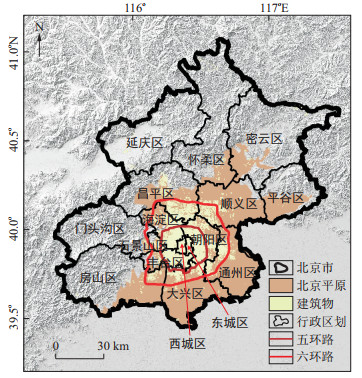Time-series InSAR deformation gradient estimation and urban buildings risk assessment: A case study in the Beijing Plain
-
摘要:
城市地表的差异性形变易对其表面基础设施造成断裂、扭曲等威胁或损害, 监测差异性形变并评估建筑物风险等级对人民生命财产安全至关重要。采用时序InSAR方法对Sentinel-1卫星数据进行时间序列分析, 获取了研究区地表形变及空间形变梯度; 结合夜光遥感数据、土地利用类型数据集、建筑物高程数据等多源外部数据, 采用网络层次分析法计算了研究区的危险性和易损性指标, 并由此开展了宏观风险评估; 在微观层面上评估建筑物的风险性, 识别潜在风险区域, 对宏观风险评估结果进行补充, 并进行对比实验验证了本研究的有效性。研究结果显示, 朝阳区东部、通州区西北部具有较大的差异性形变; 首都国际机场区域、安定南街附近等地区存在较高的风险性。因此, 利用多源数据进行差异性形变监测和风险评估对城市安全运行具有重要意义。
Abstract:Objective Differential deformation of urban land surfaces can threaten or damage surface infrastructure, leading to fractures and distortions. Monitoring spatial differential deformation and assessing associated risk levels are crucial for urban safety management.
Methods This study employs Sentinel-1 satellite data and the time series InSAR techniques to analyze surface deformation over time, enabling the derivation of spatial-temporal deformation gradients. Hazard and vulnerability assessment factors are calculated using an analytic hierarchy process, integrating data such as nighttime light remote sensing, land use, and Chinese building height datasets.A macroscopic risk assessment is conducted, with supplementary microscopic-levelanalysis to assess building risks and identify potential high-risk areas. Comparison experiments verify the effectiveness of the research.
Conclusion Significant deformation disparities are identified between the eastern Chaoyang District and the northwestern Tongzhou District. In addition, high-risk areas are observed around the Capital International Airport region and the vicinity of Anding South Street. Therefore, the study highlights the importance of multisource data for effectively monitoring differential deformation to ensureurban safe.
-
表 1 宏观危险性分级标准和权重
Table 1. Macro hazard classification standards and weights
危险性因子 危险性分级标准 权重 非常高(H3) 高(H2) 中(H1) 低(H0) 水平向累计形变/m ≤-0.06或
≥0.06(-0.06, -0.04]或
[0.04, 0.06)(-0.04, -0.02]或
[0.02, 0.04)(-0.02, 0.02) 0.08 垂直向累计形变/m ≤-0.15或
≥0.06(-0.15, -0.08]或
[0.04, 0.06)(-0.08, -0.05]或
[0.02, 0.04)(-0.05, 0.02) 0.16 垂直向空间形变梯度(弧度形变)/10-4 ≥1.2 [0.8, 1.2) [0.4, 0.8) [0, 0.4) 0.20 水平向空间形变梯度(弧度形变)/10-4 ≥1.0 [0.5, 1.0) [0.3, 0.5) [0, 0.3) 0.32 相位梯度堆叠 ≥0.8 [0.5, 0.8) [0.3, 0.5) [0, 0.3) 0.24 表 2 宏观易损性分级标准和权重
Table 2. Macro vulnerability classification standards and weights
易损性因子 易损性分级标准 权重 非常高(V3) 高(V2) 中(V1) 低(V0) 人口密度/(人·km-2) >80 000 (8 000, 80 000] (800, 8 000] [0, 800] 0.2 GDP/亿元 >5 000 (500, 5 000] (50, 500] [0, 50] 0.2 夜光遥感强度 >800 (500, 800] (300, 500] [0, 300] 0.2 建筑物高度/m >20 (10, 20] (5, 10] [0, 5] 0.4 表 3 宏观风险评估分级
Table 3. Macro risk assessment classification
易损性等级 危险性等级 H0 H1 H2 H3 V0 R0 R0 R1 R2 V1 R0 R1 R2 R3 V2 R1 R2 R3 R4 V3 R2 R3 R4 R4 注:R0,R1,R2,R3,R4分别为宏观风险非常低、低、中、高、非常高5个风险性等级,下同 表 4 建筑物易损性分级标准和权重
Table 4. Classification standards and weights of buildings vulnerability
易损性因子 易损性分级标准 权重 非常高(V3) 高(V2) 中(V1) 低(V0) 夜光遥感强度 >500 (400, 500] (300, 400] (200, 300] 0.5 建筑物体积/m3 >50 000 (10 000, 50 000] (5 000, 10 000] (0, 5 000] 0.5 表 5 建筑物风险评估分级
Table 5. Buildings risk assessment classification
易损性等级 危险性等级 H0 H1 H2 H3 V0 R0 R0 R0 R1 V1 R0 R0 R1 R2 V2 R0 R1 R2 R3 V3 R1 R2 R3 R3 表 6 对照实验评价因子分级
Table 6. Classification of control experiment evaluation factors
评价因子 风险性分级标准 高(R3) 中(R2) 低(R1) 非常低(R0) 空间形变梯度/10-4 ≥1.2(H3) [0.8, 1.2)(H2) [0.4, 0.8)(H1) [0, 0.4)(H0) 人口密度/(人·km-2) >80 000(V3) (8 000, 80 000](V2) (800, 8 000](V1) [0, 800](V0) -
[1] 胡喜梅, 马传明, 邓波, 等. 江苏省沿海地区地面沉降风险评价[J]. 地质科技情报, 2017, 36(2): 222-228.HU X M, MA C M, DENG B, et al. Risk evaluation of land subsidence in coastal areas of Jiangsu Province[J]. Geological Science and Technology Information, 2017, 36(2): 222-228. (in Chinese with English abstract) [2] 魏以宽, 闵天, 邹崇尧, 等. 基于InSAR的武汉地区2016-2021年地面沉降监测[J]. 地理空间信息, 2023, 21(10): 69-72. doi: 10.3969/j.issn.1672-4623.2023.10.017WEI Y K, MIN T, ZOU C Y, et al. Land subsidence monitoring in Wuhan from 2016 to 2021 based on InSAR[J]. Geospatial Information, 2023, 21(10): 69-72. (in Chinese with English abstract) doi: 10.3969/j.issn.1672-4623.2023.10.017 [3] ZHAO F M, GONG W P, TANG H M, et al. An integrated approach for risk assessment of land subsidence in Xi'an, China using optical and radar satellite images[J]. Engineering Geology, 2023, 314: 106983. doi: 10.1016/j.enggeo.2022.106983 [4] WANG Z Y, BALZ T, ZHANG L, et al. Using TSX/TDX pursuit monostatic SAR stacks for PS-InSAR analysis in urban areas[J]. Remote Sensing, 2018, 11(1): 26. doi: 10.3390/rs11010026 [5] 王腾, 廖明生. Sentinel-1卫星数据提取同震形变场: 最新技术及震例[J]. 遥感学报, 2018, 22(增刊1): 120-127.WANG T, LIAO M S. Coseismic displacement derived from Sentinel-1 data: Latest techniques and case studies[J]. Journal of Remote Sensing, 2018, 22(S1): 120-127. (in Chinese with English abstract) [6] 蔡杰华, 张路, 董杰, 等. 九寨沟震后滑坡隐患雷达遥感早期识别与形变监测[J]. 武汉大学学报(信息科学版), 2020, 45(11): 1707-1716.CAI J H, ZHANG L, DONG J, et al. Detection and monitoring of post-earthquake landslides in Jiuzhaigou using radar remote sensing[J]. Geomatics and Information Science of Wuhan University, 2020, 45(11): 1707-1716. (in Chinese with English abstract) [7] 李思慧, 董杰, 张路, 等. 时序InSAR对流层大气延迟改正的相位堆叠方法[J]. 遥感学报, 2023, 27(10): 2406-2417.LI S H, DONG J, ZHANG L, et al. Time-series InSAR tropospheric atmospheric delay correction based on common scene stacking[J]. National Remote Sensing Bulletin, 2023, 27(10): 2406-2417. (in Chinese with English abstract) [8] DONG J, GUO S K, WANG N, et al. Tri-decadal evolution of land subsidence in the Beijing Plain revealed by multi-epoch satellite InSAR observations[J]. Remote Sensing of Environment, 2023, 286: 113446. doi: 10.1016/j.rse.2022.113446 [9] CIGNA F, CABRAL-CANO E, OSMANOĈLU B, et al. Detecting subsidence-induced faulting in Mexican urban areas by means of Persistent Scatterer Interferometry and subsidence horizontal gradient mapping[C]//Anon. 2011 IEEE International Geoscience and Remote Sensing Symposium. [S. l.]: IEEE, 2011: 2125-2128. [10] 秦欢欢. 北京平原地面沉降数值模拟情景分析[J]. 地质科技情报, 2019, 38(1): 221-227.QIN H H. Numerical simulation and scenario analysis of land subsidence in Beijing Plain[J]. Geological Science and Technology Information, 2019, 38(1): 221-227. (in Chinese with English abstract) [11] ERTEN H, BOSTANCI E, ACICI K, et al. Semantic segmentation with high-resolution Sentinel-1 SAR data[J]. Applied Sciences, 2023, 13(10): 6025. doi: 10.3390/app13106025 [12] 仵倩玉, 王密, 陈俊博. 语义描述驱动的启明星一号自主任务规划方法[J]. 武汉大学学报(信息科学版), 2023, 48(8): 1264-1272.WU Q Y, WANG M, CHEN J B. Semantic description driven autonomous mission planning method for QMX-1[J]. Geomatics and Information Science of Wuhan University, 2023, 48(8): 1264-1272. (in Chinese with English abstract) [13] 王妤, 孙斌栋. 城市规模分布对地区收入差距的影响: 基于LandScan全球人口数据库的实证研究[J]. 城市发展研究, 2021, 28(6): 25-32.WANG S, SUN B D. The effect of city size distribution on regional income disparities: An empirical research based on LandScan population database[J]. Urban Development Studies, 2021, 28(6): 25-32. (in Chinese with English abstract) [14] ZHAO N Z, LIU Y, CAO G F, et al. Forecasting China's GDP at the pixel level using nighttime lights time series and population images[J]. GIScience & Remote Sensing, 2017, 54(3): 407-425. [15] WU W B, MA J, BANZHAF E, et al. A first Chinese building height estimate at 10 m resolution(CNBH-10 m)using multi-source earth observations and machine learning[J]. Remote Sensing of Environment, 2023, 291: 113578. doi: 10.1016/j.rse.2023.113578 [16] GONG P, CHEN B, LI X C, et al. Mapping essential urban land use categories in China(EULUC-China): Preliminary results for 2018[J]. Science Bulletin, 2020, 65(3): 182-187. doi: 10.1016/j.scib.2019.12.007 [17] YANG J, HUANG X. The 30 m annual land cover dataset and its dynamics in China from 1990 to 2019[J]. Earth System Science Data, 2021, 13(8): 3907-3925. doi: 10.5194/essd-13-3907-2021 [18] KARRA K, KONTGIS C, STATMAN-WEIL Z, et al. Global land use/land cover with Sentinel 2 and deep learning[C]//Anon. 2021 IEEE International Geoscience and Remote Sensing Symposium IGARSS. [S. l.]: IEEE, 2021: 4704-4707. [19] WEGNVLLER U, WERNER C, STROZZI T, et al. Sentinel-1 support in the GAMMA Software[C]//Anon. International Conference on ENTERprise Information Systems/International Conference on Project MANagement/International Conference on Health and Social Care Information Systems and Technologies(CENTERIS/ProjMAN/HCist). [S. l.]: Elsevier B.V., 2016, 100: 1305-1312. [20] HAWKER L, UHE P, PAULO L, et al. A 30 m global map of elevation with forests and buildings removed[J]. Environmental Research Letters, 2022, 17(2): 024016. doi: 10.1088/1748-9326/ac4d4f [21] TANG W, MOTAGH M, ZHAN W. Monitoring active open-pit mine stability in the Rhenish coalfields of Germany using a coherence-based SBAS method[J]. International Journal of Applied Earth Observation and Geoinformation, 2020, 93: 102217. doi: 10.1016/j.jag.2020.102217 [22] 尹勇, 史先琳, 钟佳宏, 等. 联合升降轨Sentinel-1A监测攀枝花机场高边坡二维形变[J]. 测绘与空间地理信息, 2023, 46(12): 45-48.YIN Y, SHI X L, ZHONG J H, et al. Monitoring 2D deformation of high slope in Panzhihua airport by joint lifting rail Sentinel-1A[J]. Geomatics & Spatial Information Technology, 2023, 46(12): 45-48. (in Chinese with English abstract) [23] CABRAL-CANO E, DIXON T H, MIRALLES-WILHELM F, et al. Space geodetic imaging of rapid ground subsidence in Mexico City[J]. Geological Society of America Bulletin, 2008, 120(11/12): 1556-1566. [24] CIGNA F, TAPETE D. Satellite InSAR survey of structurally-controlled land subsidence due to groundwater exploitation in the Aguascalientes Valley, Mexico[J]. Remote Sensing of Environment, 2021, 254: 112254. doi: 10.1016/j.rse.2020.112254 [25] FU L, ZHANG Q, WANG T, et al. Detecting slow-moving landslides using InSAR phase-gradient stacking and deep-learning network[J]. Frontiers in Environmental Science, 2022, 10: 963322. doi: 10.3389/fenvs.2022.963322 [26] 李德仁, 李熙. 论夜光遥感数据挖掘[J]. 测绘学报, 2015, 44(6): 591-601.LI D R, LI X. An overview on data mining of nighttime light remote sensing[J]. Acta Geodaetica et Cartographica Sinica, 2015, 44(6): 591-601. (in Chinese with English abstract) [27] SHI P J, SHUAI J B, CHEN W F, et al. Study on large-scale disaster risk assessment and risk transfer models[J]. International Journal of Disaster Risk Science, 2010, 1(2): 1-8. [28] TURNER B L 2nd, KASPERSON R E, MATSON P A, et al. A framework for vulnerability analysis in sustainability science[J]. Proceedings of the National Academy of Sciences of the United States of America, 2003, 100(14): 8074-8079. [29] CUTTER S L, BARNES L, BERRY M, et al. A place-based model for understanding community resilience to natural disasters[J]. Global Environmental Change, 2008, 18(4): 598-606. doi: 10.1016/j.gloenvcha.2008.07.013 [30] BIRKMANN J, CARDONA O D, CARREÑO M L, et al. Framing vulnerability, risk and societal responses: The MOVE framework[J]. Natural Hazards, 2013, 67(2): 193-211. doi: 10.1007/s11069-013-0558-5 [31] 周姝天, 翟国方, 施益军, 等. 城市自然灾害风险评估研究综述[J]. 灾害学, 2020, 35(4): 180-186.ZHOU S T, ZHAI G F, SHI Y J, et al. A literature review of urban natural disaster risk assessment[J]. Journal of Catastrophology, 2020, 35(4): 180-186. (in Chinese with English abstract) [32] ZHANG Z H, ZHANG S B, HU C T, et al. Hazard assessment model of ground subsidence coupling AHP, RS and GIS: A case study of Shanghai[J]. Gondwana Research, 2023, 117: 344-362. doi: 10.1016/j.gr.2023.01.014 [33] 赵帆, 方世跃, 祁欣海, 等. 基于ANP与ArcGIS的城市火灾风险评估[J]. 科学技术与工程, 2023, 23(3): 1308-1318.ZHAO F, FANG S Y, QI X H, et al. Urban fire risk assessment based on ANP and ArcGIS[J]. Science Technology and Engineering, 2023, 23(3): 1308-1318. (in Chinese with English abstract) [34] CIRO AUCELLI P P, DI PAOLA G, INCONTRI P, et al. Coastal inundation risk assessment due to subsidence and sea level rise in a Mediterranean alluvial plain(Volturno coastal plain-southern Italy)[J]. Estuarine, Coastal and Shelf Science, 2017, 198: 597-609. [35] CATANI F, CASAGLI N, ERMINI L, et al. Landslide hazard and risk mapping at catchment scale in the Arno River basin[J]. Landslides, 2005, 2(4): 329-342. [36] VARNES D J. Landslide hazard zonation: A review of principles and practice[M]. Paris: United Nations Educational, Scientific and Cultural Organization, 1984. [37] 李玉梅, 罗勇, 赵龙. 北京市平原区地面沉降研究进展与思考[J]. 灾害学, 2023, 38(4): 121-126.LI Y M, LUO Y, ZHAO L. The advance and considerations on land subsidence in Beijing Plain[J]. Journal of Catastrophology, 2023, 38(4): 121-126. (in Chinese with English abstract) [38] 张熔鑫, 邢会林, 舒涛, 等. 中国地震科学实验场断层系统的三维计算网格模型[J]. 地震, 2023, 43(3): 18-33.ZHANG R X, XING H L, SHU T, et al. 3D mesh for the fault system in China seismic experimental site[J]. Earthquake, 2023, 43(3): 18-33. (in Chinese with English abstract) [39] LIU Z P, TANG H, FENG L, et al. China building rooftop area: The first multi-annual(2016-2021) and high-resolution(2.5 m) building rooftop area dataset in China derived with super-resolution segmentation from Sentinel-2 imagery[J]. Earth System Science Data, 2023, 15(8): 3547-3572. [40] CIGNA F, TAPETE D. Present-day land subsidence rates, surface faulting hazard and risk in Mexico City with 2014-2020 Sentinel-1 IW InSAR[J]. Remote Sensing of Environment, 2021, 253: 112161. -





 下载:
下载:












